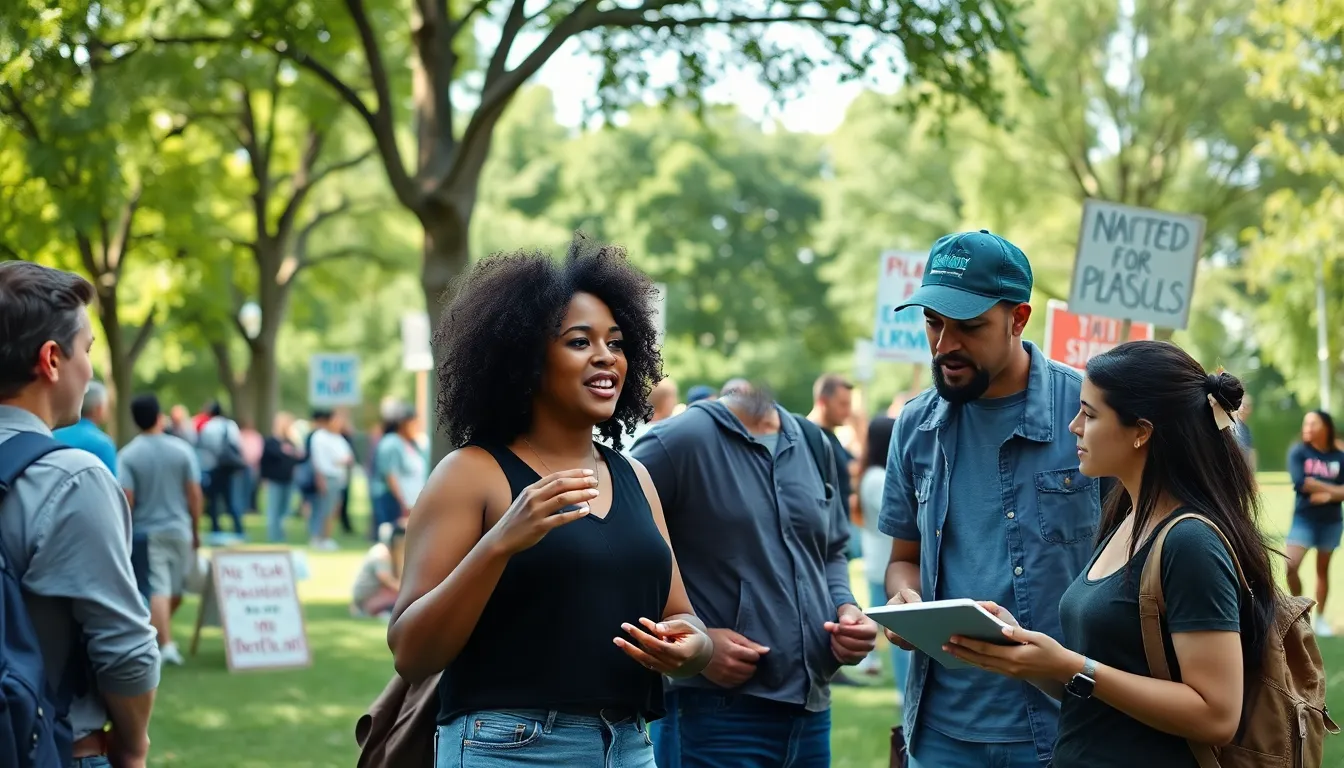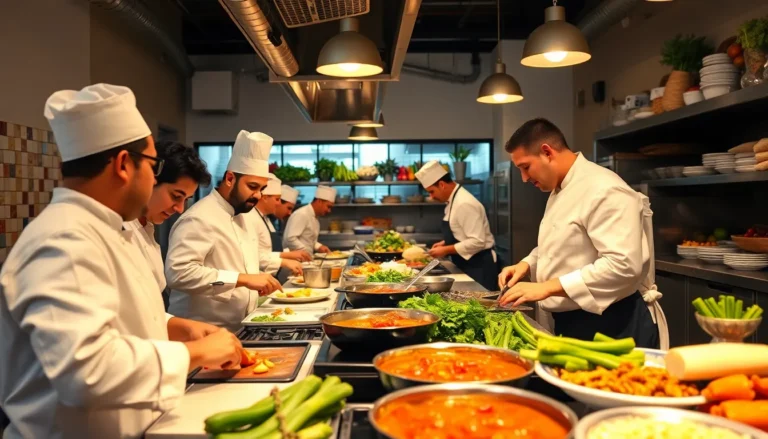Table of Contents
ToggleIn a world where news travels faster than a cat video goes viral, staying updated on current events is more crucial than ever. From political shake-ups to groundbreaking scientific discoveries, the headlines are packed with stories that shape our daily lives. Ignoring them might just leave someone feeling like they’ve been living under a rock—or worse, a particularly uninformed potato.
Overview Of Current Events
Current events shape society in many ways. Political developments, such as elections and policy changes, affect citizens’ daily lives directly. Major stories from international relations, such as trade negotiations and conflicts, also play a significant role in global stability.
Economic trends provide insight into job markets and consumer behavior. Reports on inflation rates inform individuals about purchasing power, affecting financial decisions. Healthcare breakthroughs, from vaccine developments to innovative treatments, play crucial roles in public health and individual wellness.
Environmental news, like climate change initiatives and natural disasters, raises awareness of pressing issues. Cities and nations respond to these challenges, often reshaping policies and community action plans. Social movements, addressing issues like racial or gender equality, also gain momentum and drive discussions in various platforms.
Technological advancements remain a constant force in current events. Developments in artificial intelligence and renewable energy can influence industries and lifestyles. Global events, from the Olympics to international summits, connect people through shared experiences and broadcast new ideas.
Staying informed about these stories is vital for individual and collective growth. Awareness empowers citizens to engage in informed discussions and participate in democratic processes. Ignoring current events risks detachment from critical societal issues and emerging trends. By following reliable sources, individuals can better navigate the complexities of today’s world.
Major Global Events

Current major global events encompass significant political and economic developments impacting societies worldwide. Staying informed about these events helps individuals understand the complexities of today’s world.
Political Developments
Recent elections across various countries have shaped political landscapes. Leaders from regions including Europe, Asia, and Africa have faced both new challenges and opportunities. Voter turnout trends indicate increased citizen engagement, reflecting a desire for representation. Policy changes, particularly in areas like climate action and healthcare reform, initiate discussions on social equity and sustainability. International relations also undergo shifts as nations navigate alliances and trade agreements, influencing global stability.
Economic Updates
Inflation rates have become a focal point in many economies, challenging consumers and governments alike. Central banks respond by adjusting interest rates to stabilize markets. Job growth figures show significant changes in various sectors, affecting employment opportunities. Additionally, supply chain issues persist, impacting product availability and prices. Emerging markets experience varied economic recovery, driven by investment in technology and infrastructure development. As global economies interact, awareness of these trends becomes crucial for individuals and businesses.
Current Events In The United States
Staying updated on the latest events in the United States remains essential for understanding societal dynamics and governmental direction.
Legislative Changes
Recent legislative updates have shifted the political landscape. For instance, major reforms in healthcare aim to expand access, addressing the ongoing challenges faced by millions. Additionally, new policies related to climate action reflect an urgent response to environmental concerns. Voter access laws drawn in various states present significant implications for future elections, with debates intensifying over fairness and accessibility. Changes in criminal justice reform also continue to attract attention, focusing on equity and rehabilitation rather than punishment. Each of these legislative moves impacts lived experiences across the country.
Social Movements
Social movements in the United States are gaining momentum, driving conversations on critical issues. Movements advocating for racial equality, environmental awareness, and workers’ rights resonate with diverse populations. Recent protests emphasize demands for policy changes, highlighting the necessity for community engagement and dialogue. Grassroots organizations play a vital role in mobilizing support and fostering awareness around these causes. Furthermore, online campaigns amplify voices, allowing individuals to unite for common goals. The influence of these movements shapes public opinion and encourages lawmakers to take action, further intertwining social issues with political change.
Current Events In Other Regions
Staying informed about global current events is crucial for understanding societal shifts and changes in various regions. Recent developments across Europe, Asia, and Africa provide insights into local issues that may have broader implications.
Europe
Political tensions have escalated in several European countries, impacting unity and cooperation within the European Union. Russia’s ongoing conflict with Ukraine has drawn international attention, resulting in widespread economic sanctions and debates over energy dependence. Economic forecasts reveal varying recovery rates in member states, highlighting disparities in inflation and employment. Voter engagement has intensified in countries like France and Germany, urging leaders to address climate change and healthcare reform more effectively.
Asia
In Asia, the aftermath of the COVID-19 pandemic continues to unfold, affecting social and economic structures. China’s strict lockdown measures have ignited protests, prompting discussions about governance and personal freedoms. Meanwhile, India’s economy is experiencing fluctuations due to rising inflation and policy shifts. Environmental awareness is growing, with countries like Japan investing in sustainability initiatives to combat climate change. These developments contribute to an evolving political landscape across the continent.
Africa
Africa faces both challenges and opportunities in current events. Political unrest in nations such as Sudan and Ethiopia has drawn international concern, influencing humanitarian efforts and aid distribution. The economic landscape reflects varying growth rates, with some nations advancing in technology and infrastructure while others struggle with resource management. Climate change poses significant threats, prompting regional collaborations to improve agricultural resilience. Social movements advocating for democracy and human rights continue to gain momentum, shaping public discourse and governmental responses.
Media Coverage Of Current Events
Media coverage of current events reflects the dynamic nature of information dissemination. Leading news outlets play crucial roles in shaping public perception by prioritizing timely reporting on major political and economic developments. Coverage ranges from breaking news stories to in-depth analyses, providing context for viewers and readers.
In recent months, various stories have emerged that capture the public’s attention. Elections across multiple countries have garnered significant media focus, highlighting voter engagement and shifts in political landscapes. Political analysts frequently discuss these trends, emphasizing their implications for future governance.
Economic reporting has also been prominent. Rising inflation rates, job growth fluctuations, and supply chain disruptions often dominate headlines. Such coverage informs citizens about the challenges affecting their daily lives and influences consumer confidence.
Health-related news remains vital. Ongoing debates around healthcare reforms highlight the importance of access and equity. Journalists frequently interview policymakers and healthcare experts, shedding light on changes that directly impact citizens.
Social movements are gaining traction in the media realm. Coverage of racial equality, environmental advocacy, and workers’ rights amplifies marginalized voices. Campaigns and grassroots organizations often feature prominently, reflecting a society engaged in critical discussions around equity and justice.
International events also command substantial coverage, particularly in Europe and Asia. Political tensions, such as the conflict between Russia and Ukraine, have significant implications for energy policy and economic sanctions. Demonstrations in China reveal governance challenges, while India’s economic landscape faces scrutiny over inflation.
Ultimately, staying informed is facilitated by diverse media outlets offering varied perspectives on current events. Individuals who consume this coverage gain deeper understanding, empowering them to engage in meaningful conversations about pressing issues affecting society.
Staying informed about current events is crucial for navigating the complexities of today’s world. The rapid spread of information shapes public discourse and influences personal and societal decisions. Engaging with reliable news sources empowers individuals to participate meaningfully in discussions that matter.
As political landscapes shift and social movements gain momentum, awareness of these developments fosters a more informed citizenry. Understanding local and global events enhances one’s perspective and encourages active participation in democratic processes.
Ultimately, being attuned to current events not only enriches personal knowledge but also strengthens community ties and societal progress. Embracing this responsibility can lead to a more engaged and informed populace ready to tackle the challenges ahead.








